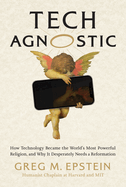
Greg Epstein (Good Without God) is a Humanist chaplain at Harvard and MIT who is concerned with the ethics of technology, and how the phenomenon of "tech" has transformed human life in the mid-21st century. In Tech Agnostic: How Technology Became the World's Most Powerful Religion, and Why it Desperately Needs a Reformation, he probes how the messaging and ethical concerns surrounding Big Tech have had a lasting impact on the human world. He incisively reads its moral and ethical messaging and its structures through the lens of organized religion. "Today technology is the water in which we swim, whether or not we notice we are fish. Tech provides contemporary Western lives, so polarized and divided in countless ways, with a universal organizing principle, a common story by which we tell ourselves who we are.... In other words: technology has become religion."
Epstein skillfully weaves his own technological experiences and observations with the study of religion as a Humanist. He also draws on a vast array of historical materials, sociological studies, and interviews with people from the tech world as well as those trying to disrupt it. The framing of tech as a religion filling the secular spaces of modern life is a persuasive one. The book is structured in three sections--Beliefs, Practices, and Beloved Community--with chapters on tech theology, doctrine, hierarchies, ritual, apocalypse, the congregation, and more included within them. This framework helps to drive home how tech has surpassed the space of producing things, and begun to take up a wider ideological space in society.
Epstein asserts that tech "possesses a theology, a set of moral messages, that dominate the way we think and feel," and that "if we can more clearly see and understand the beliefs and practices of our technological religion, we will be more likely to believe in one another, and in ourselves." He emphasizes the parallels between tech and organized religion in terms of how they both operate and pass on their messaging, as well as the "key ideas, concepts, and beliefs that animate tech today." In doing so, he argues, there will be a better chance for individuals and communities to question the power and place of tech in society, and the type of world that can be built from modern technological potentials. In other words, to consider tech through the lens of religion, or even as a religion, it will be more possible to ask exactly what society is moving toward.
Today's technological advancement may seem divorced from a past framed through religious hierarchies, but Epstein cogently outlines how tech, like religion in the past, has become "the medium through which we process our humanity." He relates tech use to ritual, tech manifestos to doctrine and theology, and even how concepts of both utopias and apocalypses (and who is destined to be affected by both) permeate this particular social phenomenon.
This, in and of itself, would be a necessary social conversation to open, but Epstein goes a step further. He proposes the idea of a reformation for tech, and explains how an agnostic approach could benefit everyone: it "leaves room for the idea that any given technology might hold potential to be of real benefit to humanity" while remaining "fiercely skeptical of any technology or technologist claiming to benefit all humans when they cannot demonstrate, in their hiring, firing, coding, and wiring, that they value different kinds and castes of humans equally."
Ultimately, the strengths of Tech Agnostic are its ability to identify solutions and to clearly articulate the problems that become visible when viewing tech as a religion. The third section of the book is devoted to movements and people who have been pushing against the discourses of inevitability and progress that benefit the few at the expense of the many. This section highlights thinkers, speakers, and groups that are actively trying to find new ways to talk about tech outside of the founder-as-savior narrative. Epstein provides access points to find communities of tech agnostics and to form collective voices that might push against the accepted doctrines.
This focus on community and connection is not one of Epstein's own making, but rather a recognition and echoing of what several of the thinkers and scholar-activists he interviews have independently identified: that as more people start to think critically of the narratives around the phenomenon of tech, they are becoming less lonely in their work, and in the interventions they are trying to make. Those interested in not only how tech has become a superimposed structure over our society, but also how something might be done about it, will find a lot to meditate on in this book. --Michelle Anya Anjirbag

